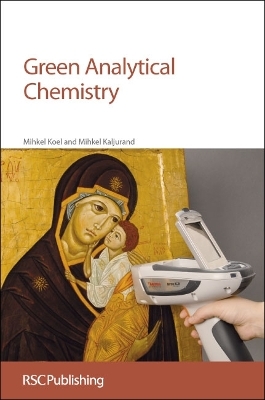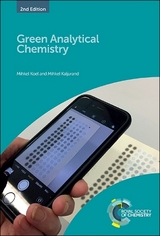
Green Analytical Chemistry
Seiten
2010
Royal Society of Chemistry (Verlag)
978-1-84755-872-5 (ISBN)
Royal Society of Chemistry (Verlag)
978-1-84755-872-5 (ISBN)
Zu diesem Artikel existiert eine Nachauflage
Introduction to green chemistry Concepts and trends in green analytical chemistry "Greening" sample preparation Green instrumental analysis "Greening" signal acquisition and processing Conclusions This book describes the applications, ideas and concepts of green chemistry in chemical analysis and evaluates the performance of current methodologies.
Concerns about environmental pollution, global climate change and hazards to human health have increased dramatically. This has led to a call for change in chemical processes including those that are part of chemical analysis. The development of analytical chemistry continues and every new discovery in chemistry, physics, molecular biology, and materials science brings new opportunities and challenges. Yet, contemporary analytical chemistry does not consume resources optimally. Indeed, the usage of toxic chemical compounds is at the highest rate ever. All this makes the emerging field of green chemistry a “hot topic” in industrial, governmental laboratories as well as in academia. This book starts by introducing the twelve principles of green chemistry. It then goes on to discuss how the principles of green chemistry can be used to assess the ‘greenness’ of analytical methodologies. The ‘green profile’ proposed by the ACS Green Chemistry Institute is also presented. A chapter on “Greening” sample preparation describes approaches to minimizing toxic solvent use, using non-toxic alternatives, and saving energy. The chapter on instrumental methods describes existing analytical approaches that are inherently green and making non-green methods greener. The final chapter on signal acquisition describes how quantitative structure-property relationship (QSPR) ideas could reduce experimental work thus making analysis greener. The book concludes with a discussion of how green chemistry is both possible and necessary. Green Analytical Chemistry is aimed at managers of analytical laboratories but will also interest teachers of analytical chemistry and green public policy makers.
Concerns about environmental pollution, global climate change and hazards to human health have increased dramatically. This has led to a call for change in chemical processes including those that are part of chemical analysis. The development of analytical chemistry continues and every new discovery in chemistry, physics, molecular biology, and materials science brings new opportunities and challenges. Yet, contemporary analytical chemistry does not consume resources optimally. Indeed, the usage of toxic chemical compounds is at the highest rate ever. All this makes the emerging field of green chemistry a “hot topic” in industrial, governmental laboratories as well as in academia. This book starts by introducing the twelve principles of green chemistry. It then goes on to discuss how the principles of green chemistry can be used to assess the ‘greenness’ of analytical methodologies. The ‘green profile’ proposed by the ACS Green Chemistry Institute is also presented. A chapter on “Greening” sample preparation describes approaches to minimizing toxic solvent use, using non-toxic alternatives, and saving energy. The chapter on instrumental methods describes existing analytical approaches that are inherently green and making non-green methods greener. The final chapter on signal acquisition describes how quantitative structure-property relationship (QSPR) ideas could reduce experimental work thus making analysis greener. The book concludes with a discussion of how green chemistry is both possible and necessary. Green Analytical Chemistry is aimed at managers of analytical laboratories but will also interest teachers of analytical chemistry and green public policy makers.
Mihkel Koel is based in the Faculty of Science at the Tallinn University of Technology in Estonia. He is a senior research scientist with a PhD in chemical analysis. Mihkel Kaljurand is a Professor of Analytical Chemistry within the Faculty of Science at the Tallinn University of Technology in Estonia.
Chapter 1: Introduction to green chemistry; Chapter 2: Concepts and trends in green analytical chemistry; Chapter 3: "Greening" sample preparation; Chapter 4: Green instrumental analysis; Chapter 5: Separation methods in analytical chemistry; Chapter 6: Greening analytical chemistry by improving signal acquisition and processing; Chapter 7: Conclusions
| Zusatzinfo | Not illustrated |
|---|---|
| Verlagsort | Cambridge |
| Sprache | englisch |
| Maße | 156 x 234 mm |
| Themenwelt | Naturwissenschaften ► Biologie ► Ökologie / Naturschutz |
| Naturwissenschaften ► Chemie ► Analytische Chemie | |
| Technik ► Umwelttechnik / Biotechnologie | |
| ISBN-10 | 1-84755-872-0 / 1847558720 |
| ISBN-13 | 978-1-84755-872-5 / 9781847558725 |
| Zustand | Neuware |
| Haben Sie eine Frage zum Produkt? |
Mehr entdecken
aus dem Bereich
aus dem Bereich
Lehrbuch zu Grundlagen, Technologie und Praxis
Buch | Hardcover (2022)
Hanser (Verlag)
34,99 €



